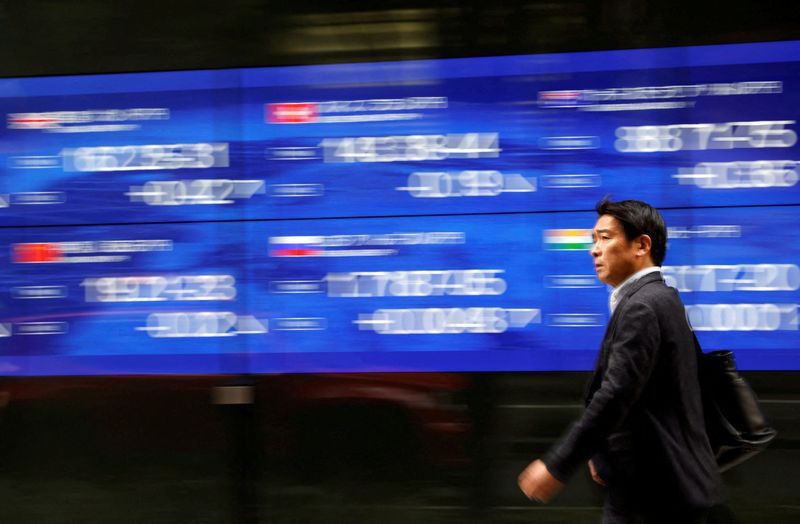Stocks on edge, Aussie surges after RBA surprise
2023.05.02 02:13

© Reuters. FILE PHOTO: A passerby walks past an electric monitor displaying various countries’ stock price index outside a bank in Tokyo, Japan, March 22, 2023. REUTERS/Issei Kato/File Photo
By Tom Westbrook
SINGAPORE (Reuters) – Asian shares wobbled in cautious trade on Tuesday ahead of a series of data releases and central bank meetings, which began with a surprise rate hike in Australia that boosted the local dollar.
Markets were positioned for Australia’s central bank to stay on hold and a 25 basis point hike sent the dollar up about 0.8% to its highest in a week at $0.6692.
Three-year Aussie government bond yields also jumped, while Australian stocks slipped 0.7%.
“One of the things that sticks out to me is that they’re still saying they might need to increase interest rates,” said Commonwealth Bank of Australia (OTC:) strategist Joe Capurso.
“So as well as the increase today, that’s supporting the Aussie dollar,” he said, though he warned that could unwind as there’s a “reasonable chance” the Federal Reserve takes a similar approach at its meeting on Wednesday.
Elsewhere there were jitters at short tenors in the U.S. Treasury market as the government’s borrowing ceiling looms, and MSCI’s broadest index of Asia-Pacific shares outside Japan was flat.
Mainland China markets were closed. hit a 16-month high, before backing off slightly, with the bank sector a drag. ()
Besides the Aussie, the yen steadied after two sessions of heavy falls following the Bank of Japan’s decision on Friday to stick with ultra-easy monetary policy for the time being. [FRX/]
The policy stands in contrast to the U.S. and Europe where central banks are deep into a hiking cycle and still going, and the contrast with Australia sent the Aussie up nearly 1% on the yen.
The yen fell through its 200-day moving average on Tuesday and hit an almost two-month low on the dollar early on Wednesday before steadying at 137.40.
The Japanese currency made a fresh 14-1/2 year trough at 151.08 per euro on Tuesday and is trading at its lowest recorded on the Swiss franc in Refinitiv data stretching back to the early 1980s.
The euro held at $1.0987.
‘UNPREDICTABLE’
Much of Europe also returns from May Day holidays on Tuesday, with final activity surveys due, preliminary inflation figures and a survey of European bank lending that will be closely watched given recent stresses in the sector.
European futures rose 0.2% in Asia, while were flat.
Interest-rate futures trade implies a 95% chance of a 25 bp hike from the Federal Reserve on Wednesday, but markets are also pricing rate cuts by year’s end.
Two-year Treasury yields, which track short-term U.S. rate expectations were steady at 4.1451% in Asia. U.S. credit default swaps – which reflect insurance against a default – are illiquid but have surged lately as political brinkmanship pushes the U.S. government near its borrowing limit.
Overnight, Treasury Secretary Janet Yellen said the Treasury might run out of money to cover obligations as soon as June 1.
One-month Treasury bill yields jumped about 16 bps in Asia and bid-offer spreads were wide. [US/]
“The next few weeks are going to be unpredictable,” Goldman Sachs (NYSE:) analysts said in a note,” with uncertainty over the precise deadline not helping to focus lawmakers’ minds.
“That could raise the risk that Congress does not lift the debt limit in time, which could result in missed payments but could also result in a short-term extension, in which case the exercise would repeat a few weeks or a few months later.”








